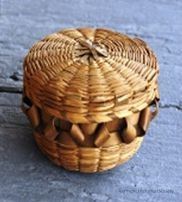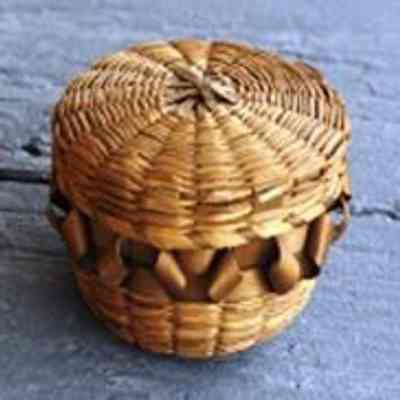Notes
The Vermont Gypsies were a well-known part of life along old Route 15 before WWII (there is 1990’s testimony from Abenaki gypsy descendants that the lifestyle subsided in the early 1930’s because of the Eugenics Survey). They would arrive in town in a couple horse drawn wagons and set up camp on a friendly farmer’s field. They traded their labor and craft arts for feed for their horses as well as food and cash. Horse feed seemed to be their most important economic need.
Information from a 1990s Johnson State College oral history project includes:
Although their main product was the “Indian Basket,” people along Rt. 15 did not think of them as Indian, but a few described them as mixed blood. Two people reported that the women wore more scarves than anyone they had seen and one thought that was the main characteristic of gypsies. There were no reports of beads or jewelry except small crucifixes, one report of a man wearing a silver religious medal. The horses and the wagons were in good shape and there were sometimes well behaved “camp dogs.” present. One elderly informant from Johnson, Vermont told of “sneaking off to hang out with the Gypsies” in the 1920’s and gave a bit of detail, including 1. they spoke another language but English in camp; 2. Their food smelled different than “Vermont food;” 3. They were very friendly and respectful, when not doing chores, everyone around camp was working on crafts, even the older children. There were a few other impressions, not negative, but nevertheless would be considered inappropriate today such as body odor and assumed sexual conduct. The men helped with farm work and did minor repairs such as blade sharpening and repairing pots and pans with little tin and aluminum patches. One man from Jeffersonville said that his family only rarely sharpened its farm tools and kitchen knives because the gypsies could put an amazing edge on a chisel or knife without “cheap and wearing the blade.” A person in Jericho reported seeing snowshoes for sale, and a miniature pair of snowshoes was sold in Jericho, the only example of a tourist miniature being sold. We have story of a “wolf fur” coat sold by the gypsies in Jericho and one of the set of small “porch chairs” chairs the men made by hand in back of the Smuggler’s Notch Inn in Jeffersonville. There were no reports of them selling herbal medicines, but they did collect herbs in the woods and on the Lamoille and Gihon River riverbank. They were said to have wintered in the pine woods in Burlington where the airport is now and traveled as far east as Danville (this was confirmed by Don Stevens, whose ancestors did the route 15 circuit).
Professor Jim Petersen of the University of Vermont, in conversation regarding his mother’s sweetgrass basket, said that she bought it from the Gypsies when they passed through Salisbury, VT (Rt. 7) before WWII, and she told Jim that she always knew that the Gypsies were Indian.
